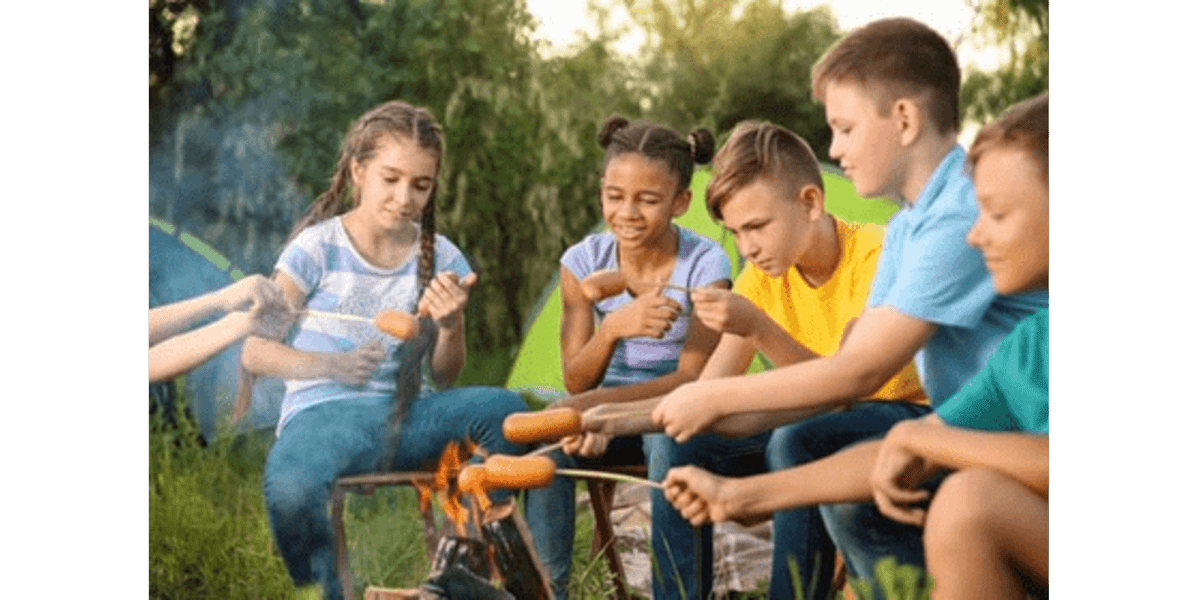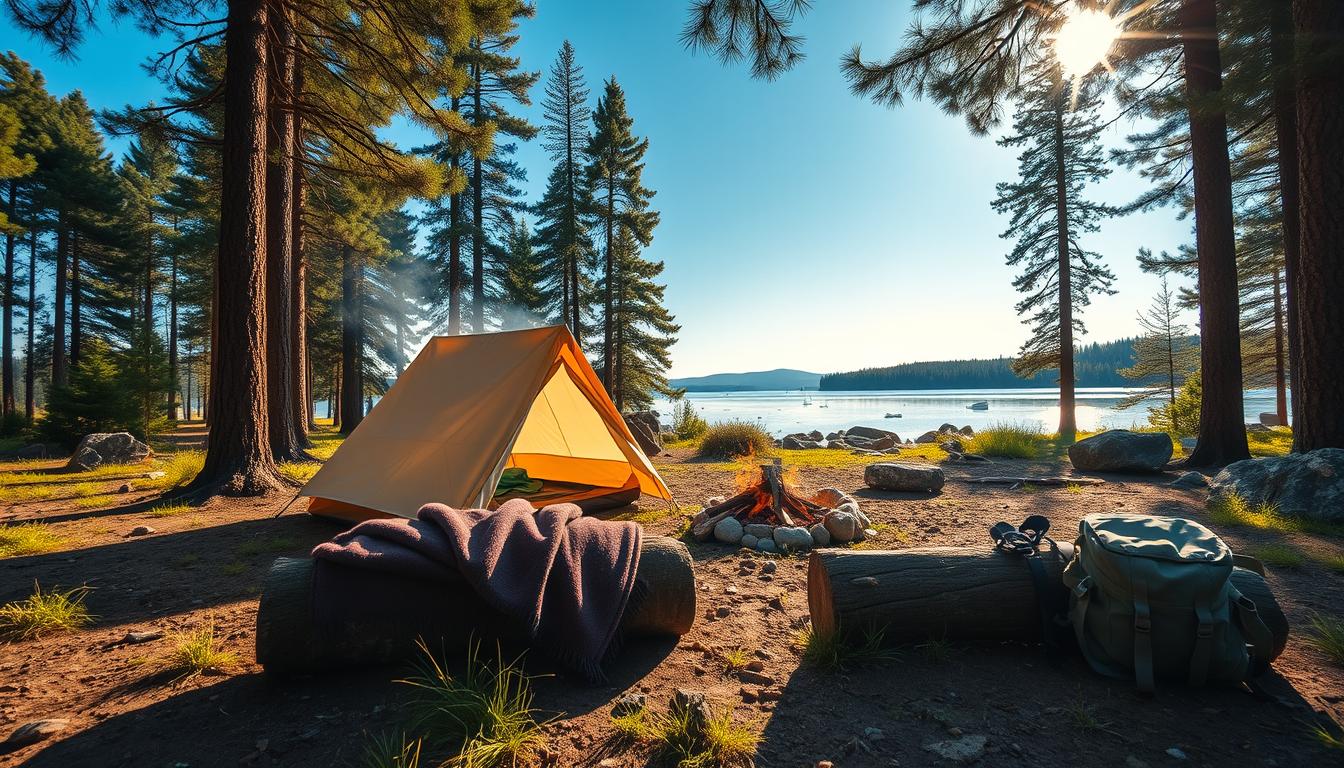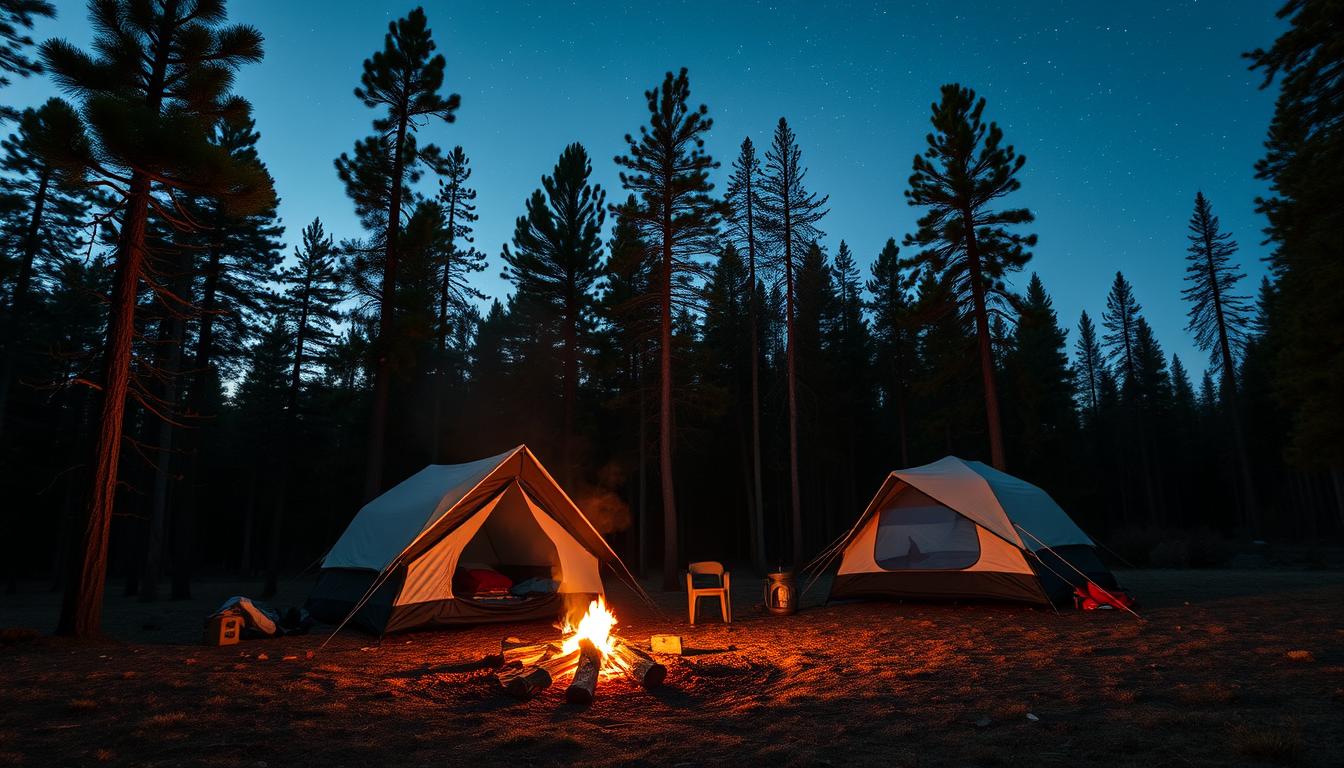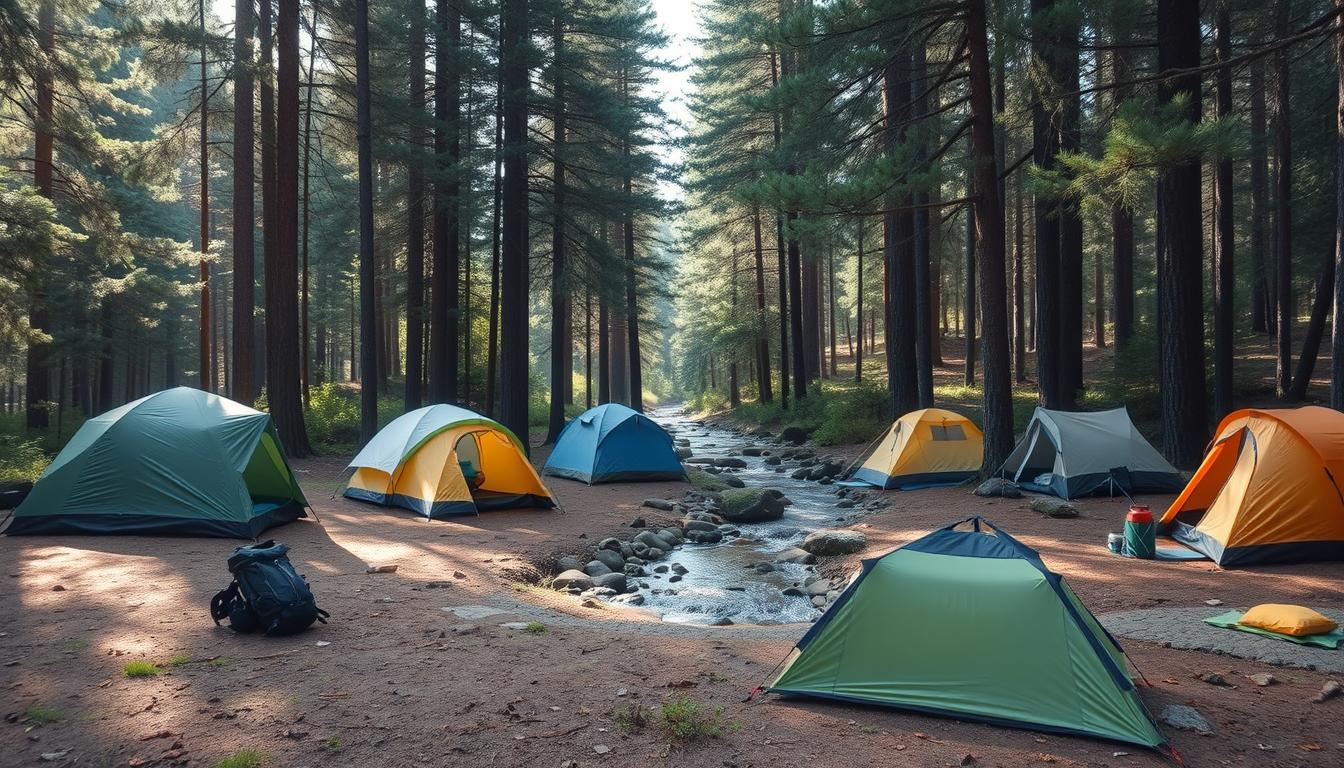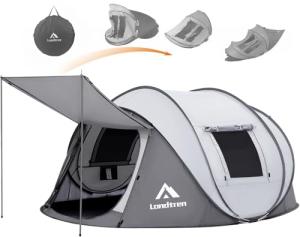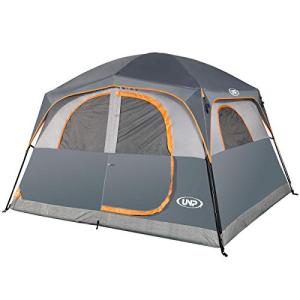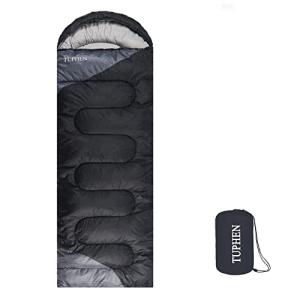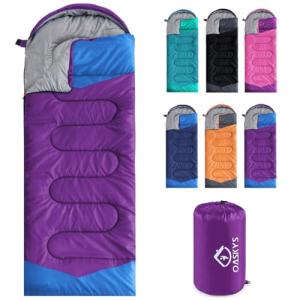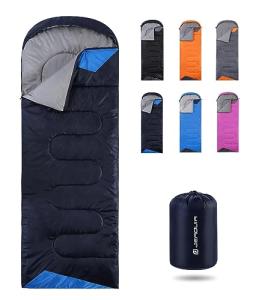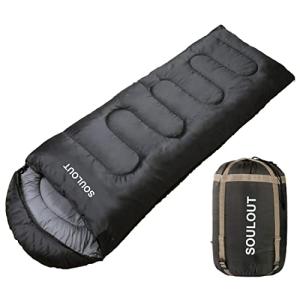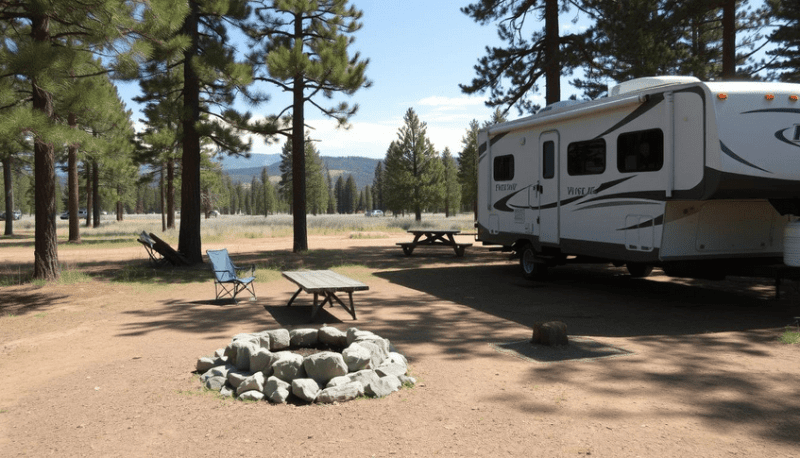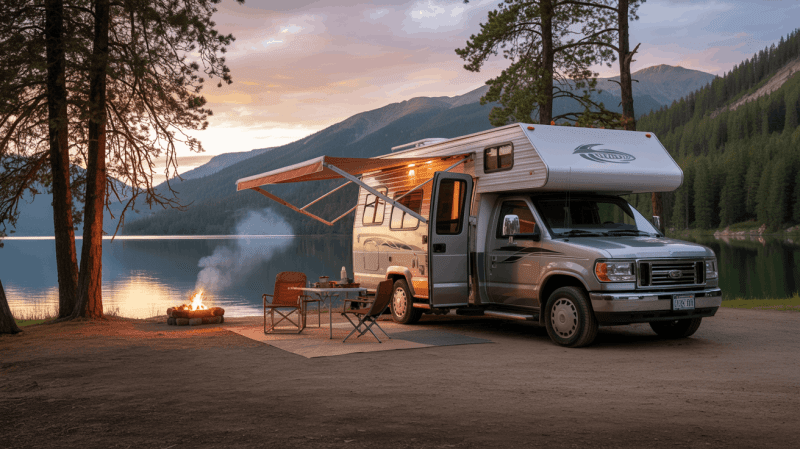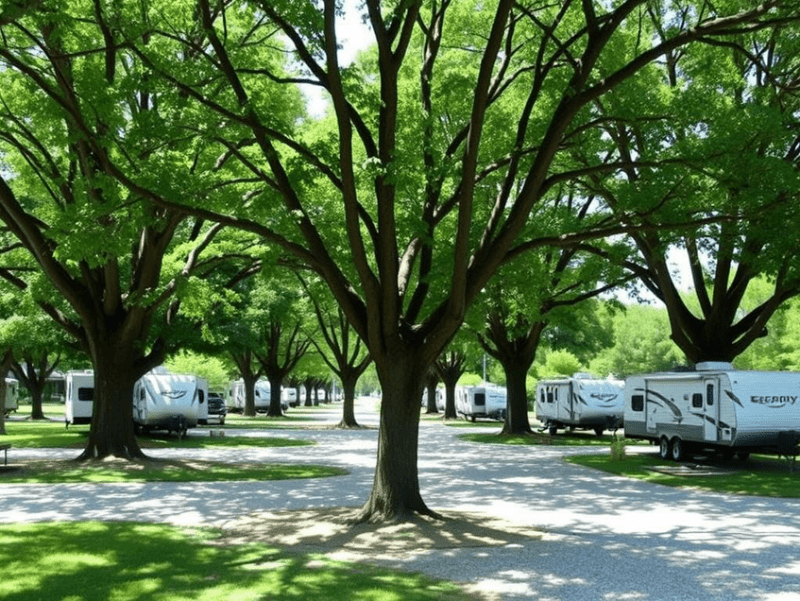Starting an outdoor adventure can be thrilling and rewarding. But, it's normal for beginners to feel a bit nervous. Don't worry! This guide will give you all the essential info and practical tips for a great first camping trip. Whether you want a calm break from daily life or an exciting outdoor journey, we've got everything you need.
Camping lets you connect with nature, relax, and make memories that last. With the right planning and mindset, even beginners can explore the wilderness with ease. In this guide, we'll cover different camping types, its benefits, and key terms. We'll also talk about planning your first trip, picking the best campsite, and what gear you'll need.
Key Takeaways
- Camping offers an escape from daily life, allowing for relaxation and exciting recreational activities in nature.
- With proper planning, first-time campers can feel confident and in control during their camping trip.
- This guide covers essential camping knowledge, campsite selection, gear recommendations, and practical tips for a successful first camping experience.
- Learning by doing is emphasized, as camping trips rarely go exactly as planned.
- Car camping is a suitable option for beginners due to its ease and accessibility, offering various amenities.
Getting Started: Essential Camping Knowledge for Beginners
Starting your first camping trip can be thrilling but also a bit scary. To make sure you have a great time, it's important to know the basics of camping. This includes understanding the different camping styles, the benefits they offer, and some key terms. Let's explore the essential knowledge you need for a fantastic tent camping adventure.
Understanding Different Types of Camping
Camping comes in many forms to fit your style and needs. Tent camping lets you sleep under the stars in a portable home. RV camping offers a cozy, home-like experience with beds and kitchens. For a touch of luxury, glamping combines nature with upscale comforts.
Benefits of Camping for First-timers
Going camping for the first time is full of advantages. It's a great way to relieve stress and connect with nature. You'll also learn important outdoor skills like survival and fire-building. Plus, it's a chance to bond with loved ones through shared adventures.
Basic Camping Terminology
To get ready for camping, learn some key terms and concepts. This includes gear like tents and stoves, and campsite features like fire pits. It's also important to know outdoor principles like Leave No Trace to camp responsibly.
Knowing about camping types, benefits, and terms will help you start your camping journey with confidence. Remember, the best trips are well-prepared ones. So, start exploring the world of tent camping and outdoor adventures.
https://youtube.com/watch?v=4bD1MswEzGI
| Camping Gear | Essentials for First-timers |
|---|---|
| Tent | Two-person tents are a popular choice for beginner campers. Opt for a lightweight model for backpacking or a heavier, more comfortable one for car camping. |
| Sleeping Bag | Mummy-shaped sleeping bags provide better insulation compared to rectangular ones, keeping you warm throughout the night. |
| Sleeping Pad | Inflatable sleeping pads are lightweight and suitable for backpackers, while foam pads offer superior insulation for a more comfortable night's sleep. |
| Camp Stove | A portable camp stove allows you to cook meals and boil water, enhancing your camping experience. |
| First-Aid Kit | A well-stocked first-aid kit should include bandages, antiseptic wipes, gauze, tweezers, and pain relievers to address minor injuries and emergencies. |
| Headlamp | A hands-free headlamp is a must-have for camping, providing illumination for tasks and activities during the night. |
| Multi-Tool | A multi-tool or Swiss Army knife can be a versatile and compact addition to your camping gear, offering a variety of functions in one convenient device. |
Planning Your First Camping Trip
Starting your first camping trip is exciting. To make it a success, planning is crucial. Let's look at the key steps to get ready for your adventure.
Choosing the right camping spot is important. Spring and fall are best for beginners because the weather is mild and bugs are fewer. Look for camping destinations like state or national parks. Also, check if you need any permits before you go.
Getting there is also key. Find out if there's a shuttle for hiking trails you want to explore. Beginners should aim for trails that are not too long (5-7 miles) and not too steep (less than 500-1,000 feet).
Being safe and having fun is the goal. Bring lots of water or a good water filter. Learn basic camping terminology and outdoor survival skills to feel ready for your trip.
For a great first camping trip, start small and pick a place that's easy for beginners. Focus on learning and having fun. With good planning, your first camping trip will be the start of many outdoor adventures.
| Recommended Camping Gear | Specifications |
|---|---|
| Backpack | 50-60 liters, e.g., REI Flash 55 or Deuter Aircontact |
| Tent | 2-person, less than 4 pounds |
| Sleeping Bag | Down, less than 3 pounds, 15-degree rating |
| Sleeping Pad | Lightweight inflatable |
| Headlamp | For hands-free illumination |
By following these tips, you'll have a great camping adventure. Always camp in an eco-friendly way by leaving no trace and caring for nature. Happy camping!
Choosing and Setting Up Your Campsite
Finding the right campsite is key for a great camping trip. We'll look at what makes a good spot and how to set up our camp efficiently.
Finding the Perfect Location
Look for a spot that's level and dry. Steep slopes and low areas can be noisy and uncomfortable. Also, find a place with some shade to stay cool during the day.
Keep a safe distance from hazards like branches and dead trees. And make sure to camp at least 200 feet away from water sources. This helps protect the environment and follows Leave No Trace rules.
Tent Pitching Fundamentals
After picking the perfect spot, it's time to set up our tent. Practice at home to get better at it. This makes setting up at the campsite easier.
Use a tarp or groundsheet under the tent for insulation. Also, face the tent door away from the wind for better comfort.
Campsite Organization Tips
Keeping our campsite organized is important. Separate sleeping, food, and gear areas to avoid wildlife problems. Organizing our stuff helps us stay efficient and clutter-free.
Also, learn about local rules for campfires, noise, and more. Being respectful of nature ensures a safe and enjoyable trip that doesn't harm the environment.
Essential Gear and Equipment Checklist
For your first camping trip, the right camping gear and outdoor gear are key. Start with a backpack that fits well, about 50-60 liters. This size is perfect for carrying all your camping essentials.
Choose a lightweight tent, under 4 pounds for two people. It should keep you dry and comfortable. A good sleeping pad is also important. You can pick from foam, air, or self-inflating pads.
Make sure your sleeping bag is the right temperature for the night. A compact camp stove, like a Jetboil, is great for quick meals.
Don't forget a headlamp for walking at night. And, consider trekking poles for better balance on trails. Quality and lightweight camping gear is worth it, but you can also find budget camping hacks. Rent or borrow expensive items for your first trips.
Always pack a first-aid kit, navigation tools, and layers of clothing. This will help you stay safe and comfortable on your adventure.
FAQ
Q: What are the different types of camping?
A: There are a few main types of camping. You can camp in a tent, use an RV, or try glamping. Glamping is a more comfortable, amenity-rich way to camp.
Q: What are the benefits of camping for first-timers?
A: Camping is great for those new to it. It lets you escape daily life and relax or have fun in nature. You can find stress relief, connect with nature, and learn new skills.
Q: What are some essential camping terms I should know?
A: You should know about camping gear like tents, sleeping bags, and camp stoves. Also, learn about campsite features like fire pits and picnic tables. Knowing these basics will help you get ready for your first camping trip.
Q: How do I plan my first camping trip?
A: Planning your first camping trip starts with picking dates and a destination. State or national parks are good choices. Decide on a trip length of 1-2 nights for beginners.
Check if you need a permit and think about how you'll get there. Choose trails that aren't too long or steep.
Q: How do I choose and set up a campsite?
A: Look for a level spot for your tent, near shade and away from dangers. Practice setting up your tent before you go. Use a tarp under your tent.
Organize your campsite well. Keep food away from where you sleep. Follow Leave No Trace to protect the environment.
Q: What essential gear should I pack for my first camping trip?
A: You'll need a good backpack, a lightweight tent, and a comfy sleeping pad. Also, bring a sleeping bag for the right temperature, a camp stove, a headlamp, and trekking poles.
Remember a first-aid kit, navigation tools, and clothes for different weather. Pack smart to keep your backpack balanced.
2-Person Waterproof Pop-Up Camping Tent
Perfect for quick setups and cozy adventures in any weather!
Product information
$89.99 $84.99
Product Review Score
4.33 out of 5 stars
54 reviewsProduct links
Spacious 6-Person Waterproof Family Camping Tent
Perfect for creating unforgettable memories under the stars with your loved ones
Product information
$149.90 $113.89
Product Review Score
4.46 out of 5 stars
161 reviewsProduct links
DISCLAIMER
This document is provided for general information purposes only and should not be relied upon as providing legal advice, technical, or specific operational guidance to the reader, whether as to the practices described in the document or the applicable legal requirements and regulations. bestcampingdeals.com expressly disclaims any responsibility for liability arising from or related to the use or misuse of any information in this document.
